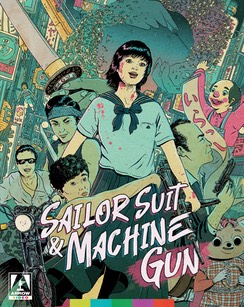
I’ve long thought that Somai Shinji is the key filmmaker for understanding Japanese cinema after 1980. If long shot long takes came to dominate Japanese art films from the nineties on, it had less to do with Mizoguchi than with Somai, himself a master of the form. His cinema also left an indelible impression on me. The first of his films I saw, Moving (Ohikkoshi, 1993), left me stunned, and I still believe Typhoon Club (Taifu kurabu, 1985) is one of the best Japanese films ever. Yet in part because his early movies were categorized in the idol genre, the gatekeepers of Japanese film in the eighties did little to promote his films and even today few of his dozen or so works are available on disc with English subtitles. There have been retrospectives, some of which I was involved in. I did a panel on Somai at the 2005 Jeongju International Film Festival (my contribution to the retro catalog can be found here), and I gave a talk on the director at the Deutschen Filmmuseum in Frankfurt in 2015. These were occasions for me to think about Somai, but I still don’t feel I have a complete grasp of him. Access to his cinema remains woefully limited outside Japan.
So I was immensely thankful when Jasper Sharp, author of Behind the Pink Curtain and now a producer at Arrow Films, asked me to write for the booklet included in the UK bluray edition of the Somai’s Sailor Suit and Machine Gun (Sera-fuku to kikanju, 1981) he was planning. I have taught the film multiple times in class, using an old English subbed DVD produced in Hong Kong, so I enjoyed the opportunity put some of my thoughts down on paper. I also am excited to now have a high-quality version of the film—the bluray includes both the original release and the longer director’s cut—for use at home and in class. The 44-page booklet also includes an essay by Alex Zahlten on Kadokawa Film and a conversation between star Yakushimaru Hiroko and Kurosawa Kiyoshi, who was an AD on the film.
Here is the opening paragraph of my contribution:
As evidenced first by its title, Shinji Sōmai’s Sailor Suit and Machine Gun is a captivating exploration of incompatibilities, of opposing terms and the liminal spaces in between them. It is the combination of not just a high school girl with violent yakuza, but realism with the fantastically absurd, the teenage virgin with adult sexuality, the high and the low, and ultimately life with death. Perhaps standing above all these is the tension between the film’s arthouse tendencies—particularly Sōmai’s masterful use of the long take—and its existence as a box-office-topping idol film starring the immensely popular 17-year-old star Hiroko Yakushimaru. As with the film’s other incompatibilities, however, this tension is best not resolved by privileging one side over the other. The pleasure of Sōmai’s cinema comes from roving through the impossible combination of such opposites.
You can check out the details, as well as purchase it through Arrow Films here.

